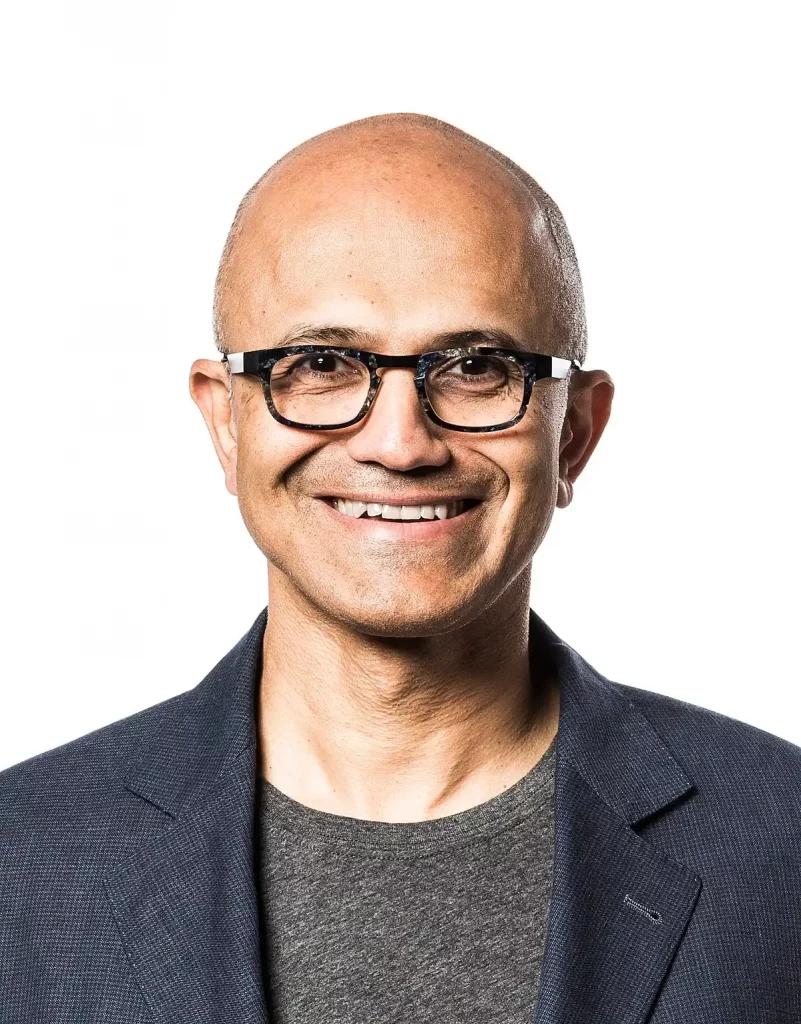Satya Nadella is a prominent technology executive best known for his role as the Chief Executive Officer (CEO) of Microsoft Corporation, one of the world’s largest technology companies. Since taking the helm in February 2014, Nadella has overseen a significant transformation of Microsoft, steering it toward a cloud-first, mobile-first world and enhancing its competitive position in various sectors.
Early Life and Education
Born on August 19, 1967, in Hyderabad, India, Nadella grew up in a family that valued education and hard work. His father, a civil servant, and his mother, a school teacher, instilled in him a strong work ethic and a love for learning. Nadella attended the Hyderabad Public School and went on to earn a Bachelor of Engineering degree in Electronics and Communication from Manipal Institute of Technology in India.
Seeking further education and a broader perspective, Nadella moved to the United States, where he earned a Master’s degree in Computer Science from the University of Wisconsin-Milwaukee. Later, he obtained an MBA from the University of Chicago Booth School of Business, further cementing his foundation in both technology and business management.
Career at Microsoft
Nadella joined Microsoft in 1992 as a program manager in the Windows Developer Relations group. Over the years, he held various leadership roles across the company, notably in enterprise and cloud computing. His early work involved key contributions to Microsoft’s SQL Server and Windows Server divisions.
In 2011, Nadella was appointed the Vice President of the Business Solutions and Cloud & Enterprise division. Under his leadership, the division saw substantial growth and was instrumental in developing Microsoft’s cloud computing strategy. His success in this role positioned him as a strong candidate for the CEO position.
As CEO of Microsoft
Satya Nadella was named CEO of Microsoft in February 2014, succeeding Steve Ballmer. His leadership style is characterized by a focus on empathy, collaboration, and innovation. Nadella emphasized a cultural shift within the company, encouraging a growth mindset among employees and fostering an environment where experimentation and learning are prioritized.
Under his guidance, Microsoft has shifted its focus towards cloud computing, which has become a significant revenue driver for the company. The introduction of Azure, Microsoft’s cloud computing platform, has established Microsoft as a leading competitor in the cloud space, alongside Amazon Web Services (AWS).
Nadella also spearheaded several strategic acquisitions, including LinkedIn in 2016 and GitHub in 2018, further expanding Microsoft’s reach in social networking and software development communities.
Achievements and Recognition
Nadella’s tenure as CEO has been marked by impressive financial performance and market capitalization growth. Under his leadership, Microsoft’s stock price has more than tripled, and the company regained its status as one of the most valuable companies globally.
His emphasis on diversity and inclusion within the workplace has also garnered attention, with Microsoft implementing various initiatives to improve representation and support for underrepresented groups.
In 2021, Nadella was recognized as one of the world’s most powerful people by Forbes and was included in Fortune’s list of the World’s 50 Greatest Leaders.
Personal Life
Satya Nadella is known for maintaining a relatively private personal life. He is married to Anu Nadella, and they have three children. The family has faced challenges, including their son Zain’s health issues, which have shaped Nadella’s perspective on empathy and the importance of community support.
In his spare time, Nadella enjoys reading and has expressed a keen interest in literature, particularly poetry. He has also written a book, “Hit Refresh,” which chronicles his journey, insights on leadership, and vision for the future of Microsoft.
Conclusion
Satya Nadella’s journey from a young boy in India to the CEO of one of the most influential companies in the world is a testament to his vision, leadership, and commitment to innovation. His focus on cloud computing, cultural transformation, and inclusion has positioned Microsoft as a leader in the technology sector, shaping the future of digital experiences for millions around the globe. As he continues to lead Microsoft, the impact of his leadership will likely resonate for years to come.



